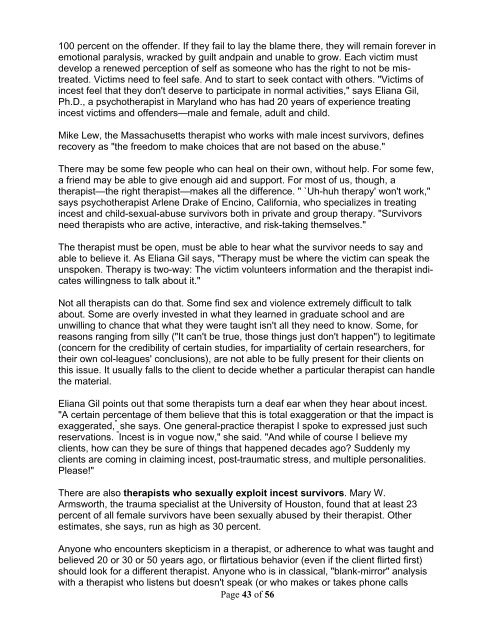Do you want to know what incest is? What it really is? No ...
Do you want to know what incest is? What it really is? No ...
Do you want to know what incest is? What it really is? No ...
Create successful ePaper yourself
Turn your PDF publications into a flip-book with our unique Google optimized e-Paper software.
100 percent on the offender. If they fail <strong>to</strong> lay the blame there, they will remain forever in<br />
emotional paralys<strong>is</strong>, wracked by guilt andpain and unable <strong>to</strong> grow. Each victim must<br />
develop a renewed perception of self as someone who has the right <strong>to</strong> not be m<strong>is</strong>treated.<br />
Victims need <strong>to</strong> feel safe. And <strong>to</strong> start <strong>to</strong> seek contact w<strong>it</strong>h others. "Victims of<br />
<strong>incest</strong> feel that they don't deserve <strong>to</strong> participate in normal activ<strong>it</strong>ies," says Eliana Gil,<br />
Ph.D., a psychotherap<strong>is</strong>t in Maryland who has had 20 years of experience treating<br />
<strong>incest</strong> victims and offenders—male and female, adult and child.<br />
Mike Lew, the Massachusetts therap<strong>is</strong>t who works w<strong>it</strong>h male <strong>incest</strong> survivors, defines<br />
recovery as "the freedom <strong>to</strong> make choices that are not based on the abuse."<br />
There may be some few people who can heal on their own, w<strong>it</strong>hout help. For some few,<br />
a friend may be able <strong>to</strong> give enough aid and support. For most of us, though, a<br />
therap<strong>is</strong>t—the right therap<strong>is</strong>t—makes all the difference. " `Uh-huh therapy' won't work,"<br />
says psychotherap<strong>is</strong>t Arlene Drake of Encino, California, who specializes in treating<br />
<strong>incest</strong> and child-sexual-abuse survivors both in private and group therapy. "Survivors<br />
need therap<strong>is</strong>ts who are active, interactive, and r<strong>is</strong>k-taking themselves."<br />
The therap<strong>is</strong>t must be open, must be able <strong>to</strong> hear <strong>what</strong> the survivor needs <strong>to</strong> say and<br />
able <strong>to</strong> believe <strong>it</strong>. As Eliana Gil says, "Therapy must be where the victim can speak the<br />
unspoken. Therapy <strong>is</strong> two-way: The victim volunteers information and the therap<strong>is</strong>t indicates<br />
willingness <strong>to</strong> talk about <strong>it</strong>."<br />
<strong>No</strong>t all therap<strong>is</strong>ts can do that. Some find sex and violence extremely difficult <strong>to</strong> talk<br />
about. Some are overly invested in <strong>what</strong> they learned in graduate school and are<br />
unwilling <strong>to</strong> chance that <strong>what</strong> they were taught <strong>is</strong>n't all they need <strong>to</strong> <strong>know</strong>. Some, for<br />
reasons ranging from silly ("It can't be true, those things just don't happen") <strong>to</strong> leg<strong>it</strong>imate<br />
(concern for the credibil<strong>it</strong>y of certain studies, for impartial<strong>it</strong>y of certain researchers, for<br />
their own col-leagues' conclusions), are not able <strong>to</strong> be fully present for their clients on<br />
th<strong>is</strong> <strong>is</strong>sue. It usually falls <strong>to</strong> the client <strong>to</strong> decide whether a particular therap<strong>is</strong>t can handle<br />
the material.<br />
Eliana Gil points out that some therap<strong>is</strong>ts turn a deaf ear when they hear about <strong>incest</strong>.<br />
"A certain percentage of them believe that th<strong>is</strong> <strong>is</strong> <strong>to</strong>tal exaggeration or that the impact <strong>is</strong><br />
exaggerated, " she says. One general-practice therap<strong>is</strong>t I spoke <strong>to</strong> expressed just such<br />
reservations. " Incest <strong>is</strong> in vogue now," she said. "And while of course I believe my<br />
clients, how can they be sure of things that happened decades ago? Suddenly my<br />
clients are coming in claiming <strong>incest</strong>, post-traumatic stress, and multiple personal<strong>it</strong>ies.<br />
Please!"<br />
There are also therap<strong>is</strong>ts who sexually explo<strong>it</strong> <strong>incest</strong> survivors. Mary W.<br />
Armsworth, the trauma special<strong>is</strong>t at the Univers<strong>it</strong>y of Hous<strong>to</strong>n, found that at least 23<br />
percent of all female survivors have been sexually abused by their therap<strong>is</strong>t. Other<br />
estimates, she says, run as high as 30 percent.<br />
Anyone who encounters skeptic<strong>is</strong>m in a therap<strong>is</strong>t, or adherence <strong>to</strong> <strong>what</strong> was taught and<br />
believed 20 or 30 or 50 years ago, or flirtatious behavior (even if the client flirted first)<br />
should look for a different therap<strong>is</strong>t. Anyone who <strong>is</strong> in classical, "blank-mirror" analys<strong>is</strong><br />
w<strong>it</strong>h a therap<strong>is</strong>t who l<strong>is</strong>tens but doesn't speak (or who makes or takes phone calls<br />
Page 43 of 56


